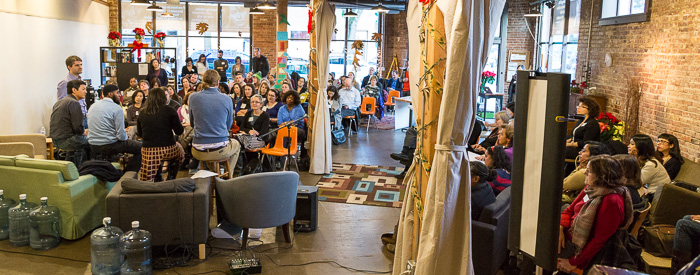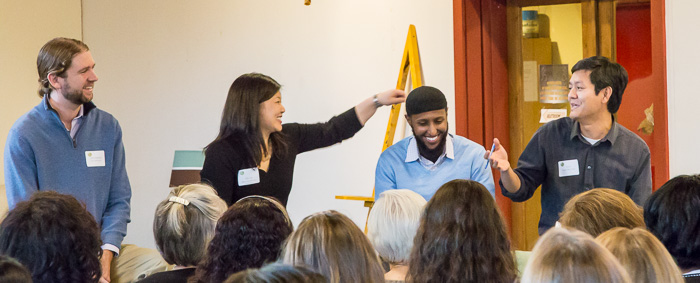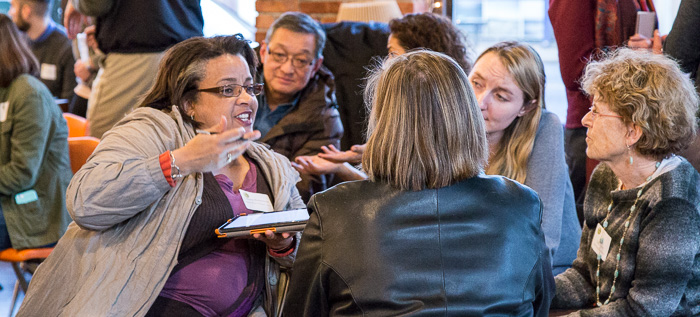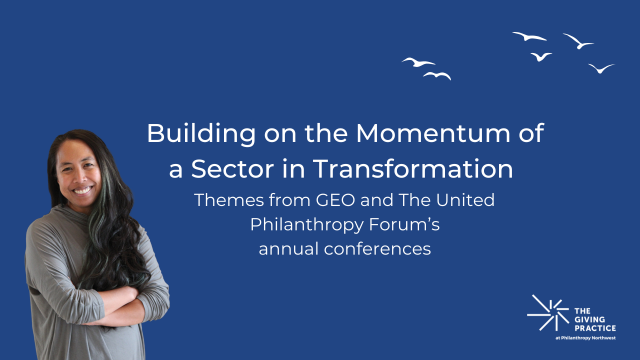by Lyn Hunter, Jon Stahl and Anne Yoon
How can funders get better at building capacity and power in communities of color? What are the unique challenges -- and opportunities -- that people of color-led organizations face in seeking funding? This week, we gathered at The Hillman City Collaboratory in Seattle's Rainier Valley with a standing-room-only crowd of nearly 80 community members, nonprofit leaders and funders for a rich conversation on these themes.

Anchored by a panel featuring Vu Le of Rainier Valley Corps, LiLi Liu of Bill & Melinda Gates Foundation, Hassan Wardere from Horn of Africa Services, John Helmiere of The Hillman City Collaboratory and moderated by Zeke Spier of Social Justice Fund Northwest, we spent two hours exploring:
The unique needs and challenges of communities of color in Rainier Valley (one of the most diverse communities in the country!)
Barriers these communities face in seeking funding
Challenges funders face in supporting these organizations
Stories of success -- what works and best practices for supporting people of color-led organizations

Here are some of the things we heard -- feel free to add your thoughts in the comments below!
Small, people of color-led organizations have big capacity challenges. They are understaffed, and there is a critical lack of staff who are fully trained in nonprofit management and leadership skills. This makes it hard for them to access grantmaking processes, satisfy complex funder requirements around evaluation, theory of change, reporting, etc.
As Vu Le has written, there's a "capacity paradox" at the heart of this -- small groups can't get sustained funding because they lack capacity, but it's sustained funding that would help them build that capacity. What happens instead is that groups get "trickle down community engagement" consisting of tiny project subgrants from larger, non-community-based nonprofits. That doesn't build sustainable, community-led organizations.

Privilege is having access and networks. Invitation-only grantmaking processes tend to exclude new voices from the table. And, how do you get "invited" to the table when you're not already "in the club?"
Funders need to embrace different ways of knowing what works. Building community relationships and power is long-term work that is hard to quantify. We can get trapped in the lens of data and measurement; we need to become more comfortable with ambiguity and discomfort.
As John Helmiere said, "Much of this work is very culturally specific and is hard to communicate in existing frameworks." Zeke Spier echoed this, saying, "Don’t just rely on written grants — it’s only a small portion of the information you get in the context of the community."
Community-based organizations need to be free to talk about their work in their own terms, without being forced into a funder's framework or theory of change. "You are asking people to lie to you" if you force them to conform to your rubric, said Zeke Spier. Systems change work relies on engaging individuals, but nobody wants to fund that work. "People funding only systems level work are free-riding on folks at the community level," Spier declared. "What if we could tithe 10% of our 'systems' funding to support work with less clear outcomes — work that is focused around people, communities and building power on their own terms, not in terms of our goals?"
Building a diverse staff means taking risk. Are we trying to diverse our hiring pool, or are we trying to build a staff that is actually diverse? As Vu Le said, "You can teach passionate person of color with a non-traditional skill set to be a program officer, but you can't teach a program officer to be a person of color."
Rainier Valley Corps is working on the "supply side" of the problem -- it plans to train cohorts of emerging community leaders to take on the mantle of nonprofit leadership in their communities. LiLi Liu was pleased to share the news that Bill & Melinda Gates Foundation has just awarded RVC a four-year $1.1 million grant, $425,000 of which is a challenge grant. They are expecting to launch their first cohort of leaders this summer.
"Show up. Listen with open ears about the possibilities. Don't come in as the expert." That's the advice one funder offered for how to start building relationships with communities of color.
How to Engage
This will be an ongoing cycle of conversation, reflection and action. If you'd like to engage, contact Lyn Hunter at Philanthropy Northwest.
Photos
We snapped a ton of great photos, which you can find in our Flickr account. Here's a slideshow.


